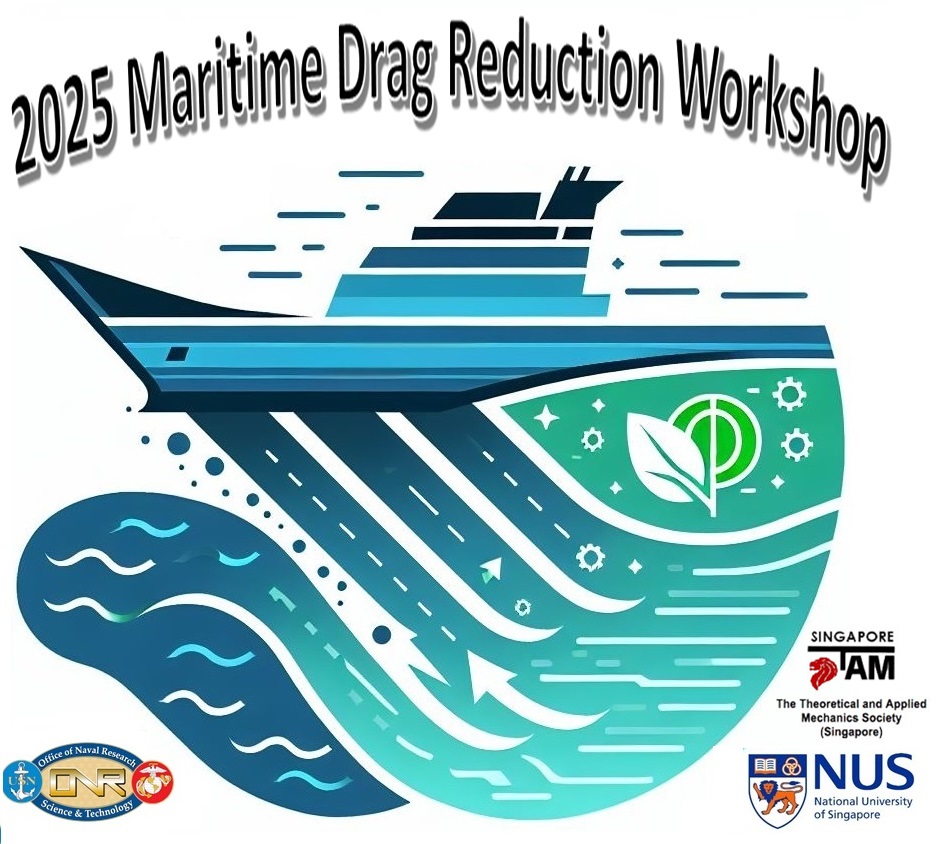Mechanisms for Energy-Efficient Skin-Friction-Drag Reduction

Date and Time
Thursday, 16th January 2025 9:00AM GMT+08:00
to
Friday, 17th January 2025 5:00PM GMT+08:00
Organisation
College of Design and Engineering
Contact Email
Chng Tat Loon: tatloon@nus.edu.sg Jonathan Tay: jonathan_tay@nus.edu.sg
Our Event Speakers
Keynote: Ivan Marusic (University of Melbourne)
Warn-Gyu Park (Pusan National University)
Van-Tu Ngyuen (Pusan National University)
Alexandros Gerakis (Luxembourg Institute of Science and Technology)
Yu-Lin Zhong (Griffith University)
Kim Boon Lua (National Yang Ming Chiao Tung University)
Industry Rep: Hung-Pin Chien (American Bureau of Shipping (ABS) Eagle)
Ronald Chan (A* - Institute of High Performance Computing (IHPC))
Zhang Mengqi (National University of Singapore)
Schedule
- 16/01/2025 08:30Registration (T-Labs Building, Level 8)
- 16/01/2025 09:00Opening Address by NUS (Prof. Khoo Boo Cheong)
- 16/01/2025 09:15Opening Address by ONR Global (Dr. Stephen E. Turner, Science Director)
- 16/01/2025 09:30Mechanisms for Energy-Efficient Skin-Friction-Drag Reduction (Ivan Marusic, University of Melbourne)
- 16/01/2025 10:30Coffee Break (Informal Discussions)
- 16/01/2025 11:00Passive Drag Reduction: Current Successes and Future Challenges (Susan Swithenbank, DARPA)
- 16/01/2025 11:30CFD-based Hull Form Optimization for Improving Vessel Energy Efficiency (Industry Rep: Hung-Pin Chien, American Bureau of Shipping (ABS) Eagle)
- 16/01/2025 12:00Lunch (T-Labs Building, Level 8)
- 16/01/2025 14:00Flow in a Textured Microchannel: Some Interesting Observations and Applications (Amit Agrawal, Indian Institute of Technology, Bombay)
- 16/01/2025 14:30Drag Reduction in Channels via Shallow Dimples (Jonathan Tay, National University of Singapore)
- 16/01/2025 15:00Coffee Break (More Informal Discussions)
- 16/01/2025 15:30Developing Non-intrusive, Non-linear Liquid Flow Diagnostics: Challenges and Breakthroughs (Alexandros Gerakis, Luxembourg Institute of Science and Technology)
- 16/01/2025 16:00Reinforcement Learning Methods for Drag Reduction in Flow Control (Zhang Mengqi, National University of Singapore)
- 17/01/2025 09:30Electrochemical Production of 2D Materials and Their Potential Application in Drag Reduction (Yu-Lin Zhong, Griffith University)
- 17/01/2025 10:00Drag Reduction Mechanisms of Superhydrophobic Surfaces in Turbulent Flow (Kim Boon Lua, National Yang Ming Chiao Tung University)
- 17/01/2025 10:30Coffee Break (Informal Discussions)
- 17/01/2025 11:00Bubble Break-up Dynamics and Magnetohydrodynamical Acceleration: Towards Air Lubrication Drag Reduction and Electromagnetic Propulsion (Ronald Chan, A* - Institute of High Performance Computing (IHPC))
- 17/01/2025 11:30Review: Skin Friction Drag Reduction with Supercavitation and Ventilated Cavitation for Underwater Bodies (Warn-Gyu Park, Pusan National University)
- 17/01/2025 12:00Modeling Cavitation Bubble and Thermodynamics of Supercavity Around Underwater Vehicles (Van-Tu Ngyuen, Pusan National University)
- 17/01/2025 12:30Lunch (T-Labs Building, Level 8)
- 17/01/2025 14:30Panel Discussion
- 17/01/2025 15:30Light Refreshments
Like & Share
Here are some suggested accommodation options: (Note: the 2025MDRW organizing committee is not affiliated to any of these organizations.)





